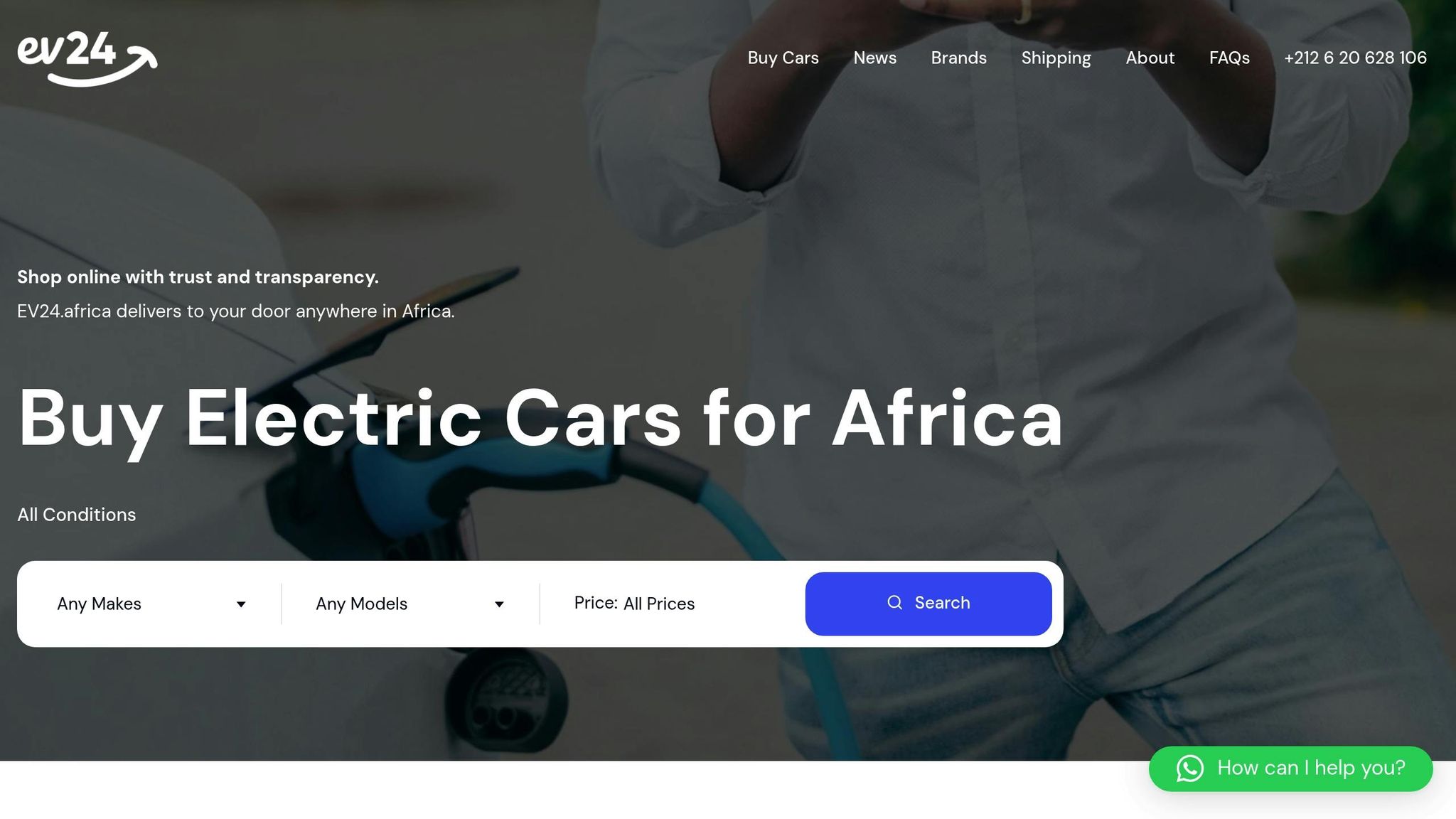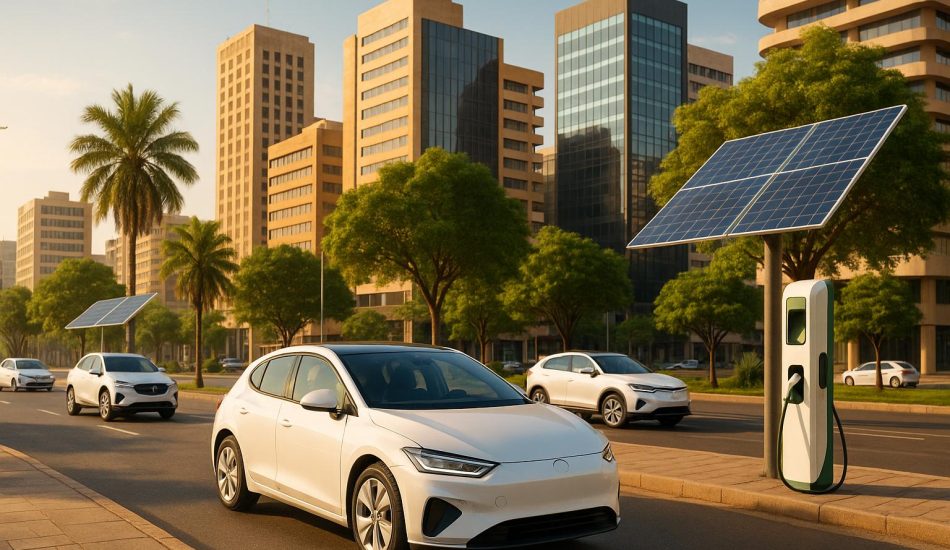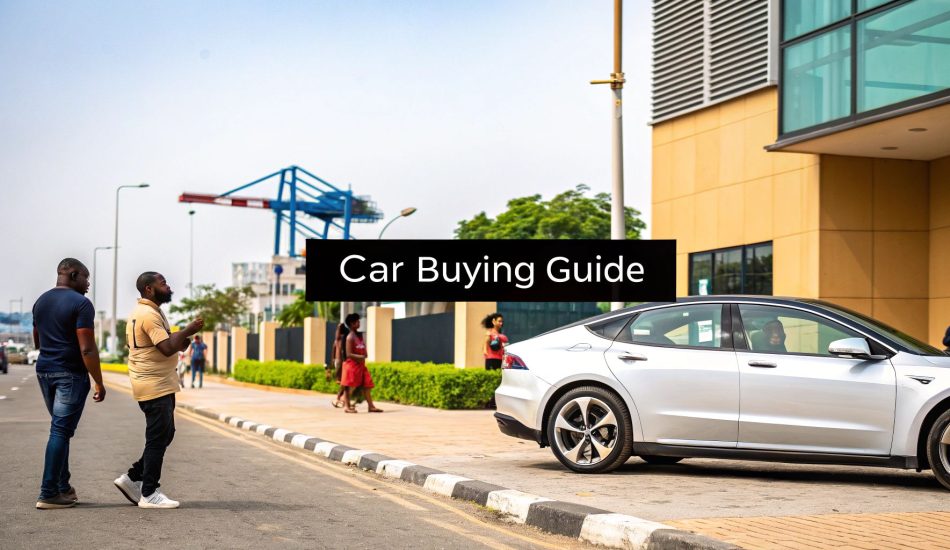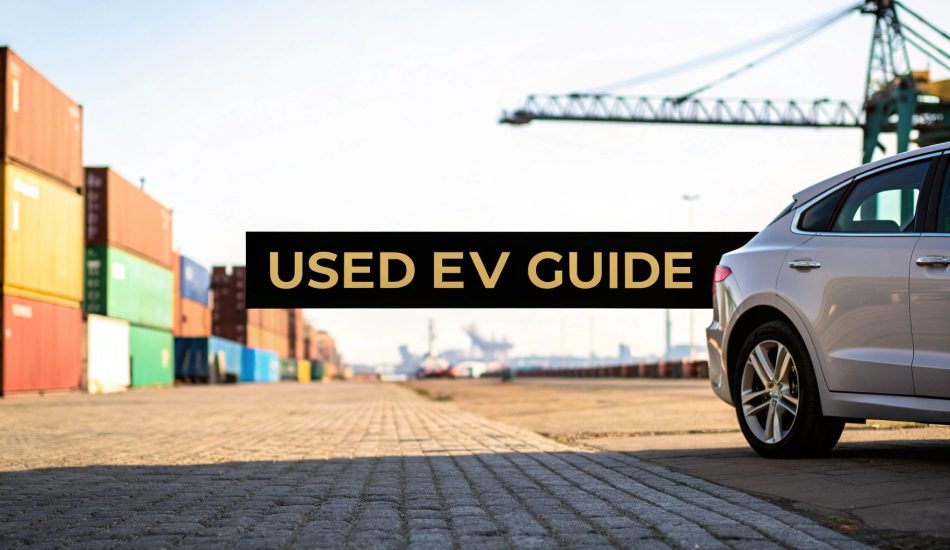
Importing an electric vehicle (EV) into Botswana in 2025 involves navigating duties, taxes, and a multi-step approval process. Here’s what you need to know:
- Import Duties: EVs from outside SACU (e.g., the U.S.) face a 27% customs duty plus 12% VAT. SACU imports (South Africa, Namibia, etc.) are duty-free but still subject to 12% VAT.
- Costs: For a $30,000 EV from the U.S., expect ~$12,852 in taxes and duties, bringing the total cost to ~$44,352 before registration and other fees.
- Approval Steps: Key steps include sourcing the EV, arranging shipping (often via Durban, South Africa), customs clearance, and vehicle registration. Required documents include an import permit, purchase invoice, and customs forms.
- Challenges: High costs, limited charging stations, and complex regulations are hurdles for EV importers.
- Support: Services like EV24.africa simplify the process by handling logistics, compliance, and registration for buyers.
Botswana’s EV market is growing, supported by government initiatives and tax incentives. By understanding the costs and following the outlined process, you can successfully import an EV into Botswana.
Import Duties and Taxes for EVs in Botswana
When importing electric vehicles (EVs) into Botswana, it’s essential to navigate specific duties and taxes. As a member of the Southern African Customs Union (SACU), Botswana follows a shared external tariff system that impacts EV import costs.
Import Duty Rates for Electric Vehicles
For EVs brought in from outside the SACU region, a 27% customs duty applies. This duty is calculated using the CIF (Cost, Insurance, and Freight) method, which includes the vehicle’s purchase price along with shipping and insurance expenses. Additionally, an extra 5% is factored in for inspection and shipping costs when determining the taxable value.
On the other hand, EVs imported from SACU member states – South Africa, Lesotho, Namibia, or Eswatini – enjoy a duty-free status. These imports are only subject to VAT, making them a more economical option.
Additional Taxes and Fees
Beyond import duties, the primary tax on EV imports is Value Added Tax (VAT) at 12%, which applies to all vehicles regardless of their origin. VAT is calculated as 12% of the total sum of the transaction value, customs duty, insurance, and freight costs.
Other expenses include customs clearance, vehicle registration, and inspection fees. These charges vary based on the specifics of the import process.
Calculating Total Landed Costs
To determine the total landed cost for an EV, several components are combined. For non-SACU imports, the breakdown looks like this:
| Cost Component | Calculation Method |
|---|---|
| Transaction Value | Price of the EV |
| Insurance & Freight | Shipping and insurance costs to Botswana |
| Customs Duty | Transaction Value × 27% (for non-SACU imports) |
| VAT | (Transaction Value + Customs Duty + Insurance + Freight) × 12% |
| Other Fees | Customs clearance, registration, and inspection charges |
| Total Landed Cost | Sum of all the components above |
For example, take a $30,000 EV imported from the United States. With estimated shipping and insurance costs of $1,500 (5% of the vehicle’s value), the customs duty would amount to $8,100 (27% of $30,000). Adding this to the transaction value and shipping costs gives a taxable total of $39,600. VAT, calculated at 12% of this amount, comes to $4,752. Altogether, the total tax burden reaches approximately $12,852, bringing the final landed cost to around $44,352 before factoring in additional fees.
For vehicles sourced from SACU countries, the process is much simpler. Only the 12% VAT applies to the total CIF value, making these imports significantly more affordable. This cost difference explains why many importers prefer to purchase EVs through South African dealers.
It’s important to remember that other variable fees, such as customs clearance, registration, and inspection costs, can influence the final expense. Understanding these factors provides a clearer picture of the full import process, which will be detailed in the next section.
EV Import Approval Process in Botswana
Bringing an electric vehicle (EV) into Botswana involves a clear set of steps and specific documentation requirements. Here’s what you need to know.
Sourcing and Purchasing Your EV
The journey starts with buying your EV from a reliable seller. Make sure to collect essential documents like the purchase invoice showing the exact price, valid vehicle registration, and proof that the car has been in use for at least one year. Most EVs destined for Botswana pass through the Port of Durban in South Africa before being transported overland.
Shipping and Logistics Arrangements
Once you’ve secured your EV, the next step is to arrange shipping and logistics. Work with freight forwarders experienced in vehicle transportation to Southern Africa to ensure a smooth process.
Before shipping, verify that your EV complies with Botswana’s import requirements. While there are no age limits for imported vehicles, all documentation must be accurate, and the vehicle should be properly prepared for international transit. Don’t forget to secure insurance coverage for the shipment and account for shipping and inspection costs in the CIF (Cost, Insurance, and Freight) value. Your logistics provider should manage the vehicle’s arrival at the Port of Durban and its transport to Botswana’s border.
Once the vehicle reaches Botswana, you’ll need to move on to customs clearance and registration.
Customs Clearance and Registration
Customs clearance is a critical step and can only be carried out by Botswana residents. To complete this process, you’ll need several documents, including:
- An import permit and residence permit from the Department of International Trade.
- The IC.2 application form.
- A purchase invoice.
- Duplicate CE101 forms.
- A police clearance certificate.
You can handle customs clearance yourself or hire a professional clearing agent to help navigate the process more efficiently. The Botswana Unified Revenue Service (BURS) will review your documents, inspect the vehicle, and collect any applicable duties and taxes before releasing it. A Trader Identification Number (TIN) is required for this electronic clearance process.
After clearing customs, the final step is registering the vehicle with Botswana authorities. This involves working with local officials in Gaborone to meet tax and registration requirements, which officially establishes your ownership of the EV.
The entire process, from submitting documents to final registration, can take several weeks. To avoid delays or unexpected costs, ensure all documentation is accurate and complete from the start.
Legal Requirements and Compliance Guidelines
Botswana’s regulations for importing electric vehicles (EVs) are designed to ensure compliance and avoid unnecessary delays. As policies evolve, keeping up-to-date with the latest rules is key to a smooth import process. Below is an overview of the safety standards, required paperwork, and available incentives for EV importers.
Safety and Emissions Standards
While Botswana has limited mandatory emissions testing, it does enforce basic safety regulations for imported vehicles. Across Africa, only eight countries currently have vehicle standards, and their implementation remains inconsistent. In Botswana, emissions testing for imports is not yet a major requirement.
However, safety regulations are becoming stricter. The African Organization for Standardization (ARSO) is working on a framework that could soon introduce higher standards for battery safety, charging compatibility, and overall vehicle performance. This shift is partly driven by health concerns, as outdoor air pollution-related mortality rates in Africa have risen by 57% over the past three decades.
Although EVs produce zero direct emissions, ensuring the safety of their battery systems and electrical components is increasingly important. Importers should remain vigilant as these regulations continue to develop.
Required Documentation for Import Approval
Importing EVs into Botswana involves more than just basic customs paperwork. A key document is the SAD 500 form, which facilitates external trade. Additional compliance certificates may also be necessary to prove the vehicle meets safety and emissions standards. These certificates are typically issued by the manufacturer or an accredited testing facility.
If your EV passes through South Africa, you’ll need to meet their specific documentation requirements. For instance, importing used vehicles into South Africa requires a letter of authority from the National Regulator for Compulsory Specifications (NRCS) and a completed application form (IE462).
Government Incentives for EV Importers
To encourage clean transportation, Botswana offers several incentives for EV importers. These include tax reductions, waivers on registration fees, and lower import duties, all aimed at fostering the growth of the EV market. In 2024, Botswana imported just 64 electric cars from China, but government initiatives are actively working to increase these numbers.
Botswana also supports clean energy adoption through various programs, some of which may extend to EV-related equipment. The government’s broader efforts – such as expanding charging infrastructure and promoting renewable energy – further bolster the EV market.
To take advantage of these incentives, importers should check with relevant government agencies to understand eligibility criteria. Requirements may include meeting minimum battery capacity thresholds, providing safety certifications, or specifying the vehicle’s intended use. Certain programs may prioritize commercial EVs or those used in public transportation and delivery services.
sbb-itb-99e19e3
How EV24.africa Simplifies the EV Import Process

Importing an electric vehicle (EV) in Botswana can feel overwhelming, but EV24.africa takes the hassle out of the process. From choosing the right vehicle to ensuring it’s delivered and registered, they handle the details, including tricky regulatory and documentation requirements. Considering Botswana’s vehicle ownership rate of 206 vehicles per 1,000 people – far above the African average of 43 per 1,000 – it’s clear there’s a strong appetite for easier EV import solutions.
EV24.africa ensures every step complies with international commercial terms (Incoterms) and Botswana’s local regulations. With a team of over 200 professionals spanning five African countries, they bring the expertise needed to navigate the complexities of cross-border EV imports. Here’s how they make the process simple with clear pricing, financing options, and dedicated support.
Wide Selection of EVs and Clear Pricing
EV24.africa connects buyers to a broad range of EVs from global suppliers in Europe, Asia, North America, and Japan. Their platform features both new and used electric vehicles from popular brands like Tesla, BYD, Leapmotor, ROX, Dongfeng, Geely, Hyundai, Toyota, and Suzuki.
What sets them apart is their transparent pricing. All vehicles are listed in US dollars, eliminating confusion around currency conversions or hidden fees. Each listing includes detailed specifications, high-quality images, and a clear cost breakdown, so buyers know exactly what they’re paying for and can plan their investment accordingly.
Financing and Delivery Options
Buying an EV is a big financial decision, and EV24.africa makes it easier by partnering with financial institutions to offer flexible leasing and loan options for individuals and businesses. These financing solutions make EV ownership more accessible by spreading costs over manageable periods.
When it comes to delivery, EV24.africa takes care of everything. They handle logistics from the Port of Durban to Botswana, offering door-to-door or port-to-port shipping through RoRo or container methods. They manage shipping arrangements, customs clearance, and registration, while providing real-time tracking so customers can monitor their vehicle’s journey every step of the way.
Expert Support and Post-Sale Services
Navigating Botswana’s EV import requirements can be daunting, but EV24.africa’s dedicated support team ensures customers meet all compliance needs. Their hands-on approach guides buyers through the entire process – from selecting the right vehicle to completing registration – making the experience smooth and stress-free.
"At EV24.africa, we simplify the process of importing and buying electric vehicles in Africa. Our expertise ensures a seamless, transparent, and stress-free experience, so you can focus on driving the future of mobility."
The support doesn’t stop after delivery. EV24.africa partners with service providers in over 40 countries to ensure customers have access to maintenance networks and technical assistance. This addresses a key concern for EV owners in emerging markets. Whether for individual buyers or businesses, EV24.africa offers a comprehensive solution that makes transitioning to electric mobility straightforward. Customers can even request a quote to let them handle every detail – from sourcing the vehicle to final delivery and registration. With their expertise, EV24.africa turns what could be a complicated process into an effortless one.
Key Takeaways for Importing EVs into Botswana
Bringing an electric vehicle (EV) into Botswana requires thorough preparation and a solid understanding of the country’s customs rules. For EVs imported from outside the Southern African Customs Union (SACU), a 27% duty and 12% VAT apply, which also cover inspection and shipping costs. However, imports from SACU countries are duty-free, offering a significant cost advantage. Ensuring you have accurate paperwork and working with reliable clearing agents can save you from costly delays.
Having a clear breakdown of fees helps with planning. For example, importing an EV priced at $30,000 would result in roughly $8,100 in customs duty and $3,600 in VAT, along with other associated charges. It’s also crucial to consider potential reciprocal tariffs, which depend on the vehicle’s country of origin, to avoid surprise expenses.
To make the process smoother, EV24.africa offers a comprehensive solution for importing EVs. They manage everything from sourcing to customs clearance and even provide door-to-door delivery with real-time tracking. Their pricing, displayed in US dollars, removes the hassle of currency conversions, and they offer flexible financing options for both personal and business buyers. With a local presence in Botswana and partnerships across more than 40 countries, EV24.africa ensures compliance with market-specific requirements, making the import process easier and more efficient.
FAQs
What documents do I need to import an electric vehicle into Botswana, and how can I make sure everything is in order?
To bring an electric vehicle (EV) into Botswana in 2025, you’ll need three essential documents:
- Import Permit: This must be obtained from the appropriate government office.
- Customs Declaration Form: Used to officially declare the vehicle during importation.
- Police Clearance Certificate: Confirms the vehicle’s authenticity and compliance with regulations.
Starting January 2025, Botswana has reduced the import duty for EVs to 25%, so make sure to include this in your budget. It’s crucial to complete all forms accurately and submit them on time to avoid any complications. Pay all required taxes and follow the customs procedures carefully to steer clear of delays or fines. Before importing, double-check the latest requirements with local authorities to ensure the process goes smoothly.
What are the cost differences and financial implications of importing an EV from a SACU country versus a non-SACU country into Botswana?
Importing an electric vehicle (EV) into Botswana from a SACU (Southern African Customs Union) country can be a more budget-friendly option. This is because vehicles from SACU countries are often exempt from import duties. On the other hand, bringing in EVs from non-SACU countries comes with a 27% customs duty and an additional 12% VAT, which can significantly drive up the total cost.
Opting for imports from SACU countries can result in noticeable savings, making it a smart choice for cutting costs – especially for businesses looking to maintain profitability. When planning your import, it’s crucial to account for these fees to ensure you’re both compliant and financially prepared.
What challenges might I encounter when importing an electric vehicle to Botswana in 2025, and how can I address them?
Importing an electric vehicle (EV) to Botswana in 2025 could present a few hurdles. Some of the most common challenges include navigating import duties and permits, managing the high upfront costs, and tackling the limited charging infrastructure, particularly in rural areas.
To make the process easier, start by staying up-to-date on Botswana’s import regulations and checking for any tax incentives that might apply to EVs. Planning ahead for charging needs is also crucial – consider installing a home charging station or researching public charging options in your area. Finally, create a detailed budget that accounts for all potential expenses, including import duties, taxes, and transportation, to avoid any financial surprises along the way.




